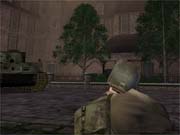Though it's been a generally lackluster period for PC action games, tactical shooters have had a great year. Between the ambitious Operation Flashpoint, the much-anticipated successor to the venerable Rogue Spear franchise, Ghost Recon, and the ongoing popularity of user-created mods such as Counter-Strike and Day of Defeat, fans of the genre have had more good games to play than ever before. For better or worse, the genre has even gained its own massively multiplayer game with the release of WWII Online. It was only a matter of time, then, before budget publishers noticed the trend and capitalized on it. The result is Deadly Dozen, Infogrames' entry into the previously nonexistent world of budget-priced tactical shooters. And true to the genre's recent run of luck, it's pretty darn good.

As the title implies, Deadly Dozen tells the story of 12 unruly but tough army misfits who, during World War II, were picked to man an elite squad of guerilla fighters for undercover missions behind enemy lines. Honestly, though, it's really the Deadly Dozen manual that does most of the storytelling. True to the example set by its full-priced competition, Deadly Dozen isn't heavy on plot, which is just fine.
The game is structured as an unrelated series of missions. Before each one, you're given a quick briefing on the mission goals. There are usually between one and four main goals, and these generally consist of finding something and then blowing it up. The final goal of each mission is always the same: guide the surviving members of your team to an extraction point.
You can pick up to four men to execute each mission and then outfit each of them with two weapons and three equipment items. The men are each rated in seven categories: small arms, heavy weapons, explosives, sniping, medical, sneaking, and toughness. The effects of most of these attributes are very clear--someone with a high sniping skill has a noticeably better chance of killing an enemy in one rifle shot, and health packs are more effective when administered by a squad member with a good medical rating. Any team member killed in action becomes unavailable for the rest of the game, which provides some continuity between missions and acts as an incentive to keep everyone alive.
The 10 missions take place across various locations in Europe and North Africa. Most levels include a mix of both indoor and outdoor environments, and all are huge. The graphics, while not state of the art, are certainly above average, especially for a budget game. The 3D engine is capable of producing some striking outdoor scenes, and the various smoke and weather effects are all well done. The one big letdown is that all the levels are filled with fog, including ones that take place in the desert in broad daylight. Perhaps to boost engine performance, an opaque plane of fog is pretty close at all times. So even though the levels each represent what's probably a couple of square miles, you'll never really get a panoramic view of your surroundings.
The fog also contributes to the game's biggest flaw--the enemy artificial intelligence. The Nazis you're fighting tend to have the uncanny ability, once they detect you, to pinpoint your position and fire on you, even if you can't really see them through the murk. If you shoot an unsuspecting guard from a distance using the sniper scope and don't manage to kill him, he'll instantly find you and fire back with deadly accuracy, even if he's armed only with an unsighted rifle. On levels with a lot of cover, this isn't as much of a problem, as it becomes easier to creep from building to building and plan your attacks more carefully. But in missions that have a lot of fog and not a lot of cover, you end up having to abandon most of the squad-based parts of the game. Even though you can give orders, such as follow, hold position, and attack, and set formations and control each man individually, the only member of your squad who's really useful in a lot of situations is the guy with the perfect rating in both sneaking and sniping. You'll often find yourself either attempting these missions with just one man or using the other three soldiers as pack mules to hang back and carry extra health kits and ammo.
Still, this same AI complaint can be made against a lot of Deadly Dozen's competition, and the enemy soldiers are at least predictable. While these flaws make a few of the levels--like the second one in which you're fighting through a graveyard maze in almost total darkness--more annoying than fun, some of the missions are great. For instance, one that involves sneaking from house to house through a burnt-out French village ranks among the most atmospheric, tensest, and generally best-executed levels in any tactical shooter to date.

This bad news/good news pattern cuts through all of Deadly Dozen. On the one hand, enemy tanks have the same unnatural ability to locate your position as do the superhuman soldiers, but on the other hand, you can drive cars! There's no multiplayer, but the squad AI is good. Some users have experienced problems running the game under Windows XP, but those who get it to work often seem pleasantly surprised. For some reason, Deadly Dozen unmaps the forward movement key every time you boot it up, but the system for giving orders to your squad is concise and easy to use. The mission maps are often not exactly accurate; one even has the wrong primary targets circled. But the orchestral score is exceptional by turns stirring and moody.
Ultimately, Deadly Dozen is more enjoyable than frustrating. It's not perfect, but given the grim history of budget titles, "not perfect" qualifies Deadly Dozen for the Nobel prize for cheap games. And it would probably win it in a year in which Serious Sam didn't also come out.